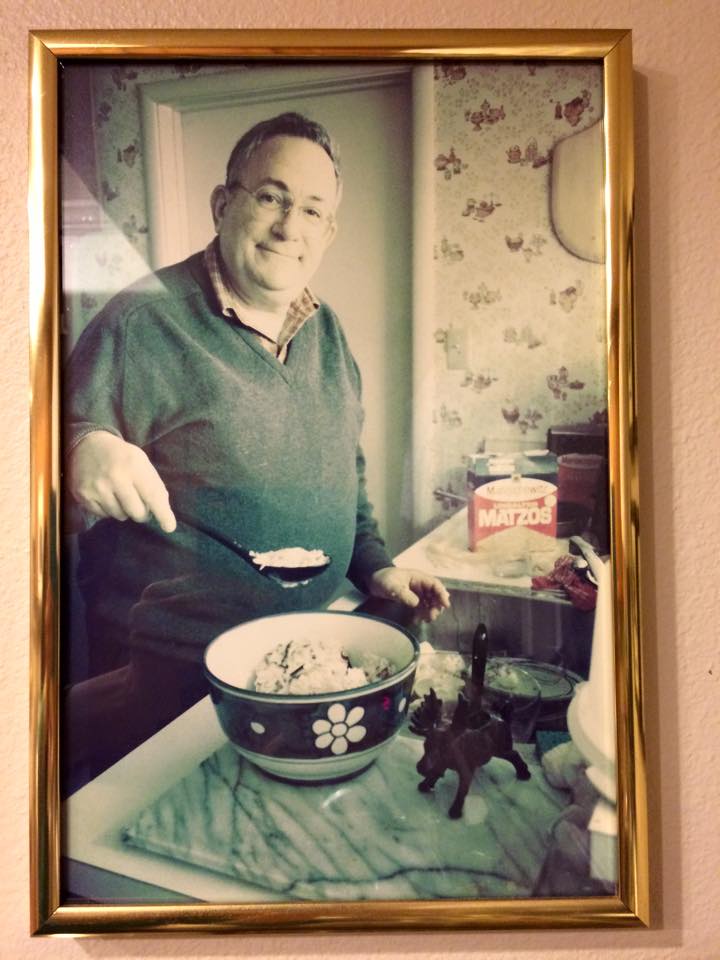
Fifteen years with no Nurn in the world. That’s what we called him. A silly, loving name for a silly, loving man. Dan Kalikow, 3/2/43-2/26/09.
But of course it’s not true that there’s no Nurn left. There is so much of him in me – I see him often in my own face – but I mean more than that. There’s so much that he left with all of us who loved him. He was a teacher at a bone-deep level, long after he left academia.
Today I want to talk about what he taught us with his death.
Let me get the technical deets out of the way: Cancer. A belly full of it, out of the blue, summer 2008. Surgery, which I flew home for. “We think we got it all.” A long and painful recovery, which I wasn’t around for; what was happening on my own home front is a separate story. Then December 2008, a checkup scan: it’s roaring back. January 2009, the only decision left: where to die.
He chose – we all chose, because I was back again by that point for the duration – home hospice.
Another set of boxes that I need to check off here: all the privileges. Literally some of the best medical care in the world, and insurance that actually covered it. A family home big enough that I could come back to stay for a few months. On and on.
And the greatest, most intangible asset of all: a family that loves each other deeply and shows it easily. I mean, usually it’s easy. For him, at the end, the way he needed to show his love for us must have been incredibly hard at least some of the time. He showed us what love looks like when it means letting go. He showed us by living it while dying.
Before he left the hospital but after the death sentence, he had my four-months-pregnant sister push him in a wheelchair through the maternity ward where she was scheduled to give birth later that year to a grandchild he would never meet. He radiated love at all the mamas and daddies and babies, finding joy in knowing that it would be our family’s turn soon, and that he was part of it now if not later.
He told our mother, his wife of 44 years – in front of all of us so we’d all know – that she should go on to love and be loved again. Which she did, ten years ago, to everyone’s joy.
He wrote us letters to keep. Letters saying how much he loved us, what he loved about us. Letters saying goodbye, letters that would never leave us. I’d forgotten, until I found mine while I was moving into my new home last year. Never forgot how much he loved me, though.
He entertained a steady stream of visitors, holding court in his inimitable way from his hospital bed in the kitchen.
He didn’t complain, to my recollection, about the many indignities and discomforts of dealing with his body’s progressive failure.
All the while, since he couldn’t eat – something that had always been one of the many joys of his life – he continued fading from a beaming big-bellied man to a wraith made of little more than love.
And fifteen years ago today, so early in the morning that it was the middle of the night, something changed suddenly in his body. I was on night duty so our mother could get a rare night of unbroken rest, and the sounds of his half-conscious distress woke me over the baby monitor we used.
Our mother woke up too, knowing somehow. She held him close, stroked his stubbly sunken cheek, crooned that it was okay for him to go. And he did.
I don’t think he felt like he was “done,” exactly. He loved life, he loved us, he wanted more. But he found space in his immense heart to be content with what was.
Dayenu, we sing at Passover. Dayenu, dayenu, goes the chorus over and over again, in a song that’s been sung by families in our tradition for a thousand-plus years. It translates something like, “Less would have been enough,” celebrating all the gifts that our stories say God gave our people. Nurn was a big ol’ atheist, but that never stopped him from believing in gratitude. Believing that the life he’d lived was more than enough to be grateful for.
Because he made peace with his death, he allowed all of us who love him to do the same. Our final days together were filled with love, and appreciation, and reminiscence that held a sharp edge of regret but not the bitterness of railing against reality. It was, and remains, an incredible gift.
He was an extraordinary man. We were so lucky to have him for the time we did. And as a memory now.
Love always. ❤️